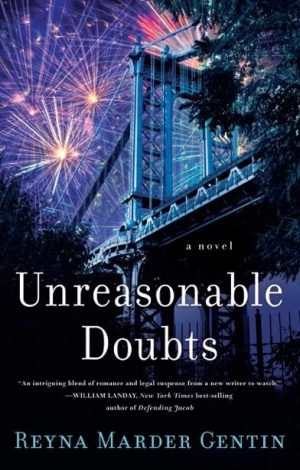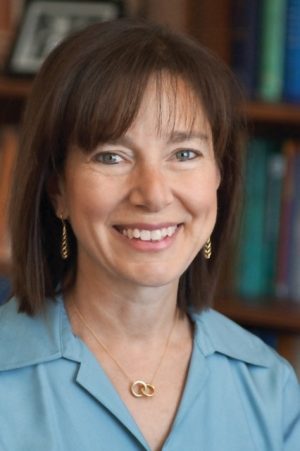 It’s hard to believe, but the end of another year is upon us. And this means two things: an opportunity to reflect upon the year that was, including the general state of our lives and careers, and… holiday shopping.
It’s hard to believe, but the end of another year is upon us. And this means two things: an opportunity to reflect upon the year that was, including the general state of our lives and careers, and… holiday shopping.
As it turns out, I have a recommendation that can help on both fronts: Unreasonable Doubts, the wonderful debut novel of Reyna Marder Gentin, my fellow Yale Law School graduate turned lawyer turned author. It’s a legal thriller with substance, a page-turner that will trigger introspection and reflection — and that also makes a great Hanukkah or Christmas or holiday gift for the lawyer, law student, or lover of good books in your life.
I recently interviewed Reyna about Unreasonable Doubts and her legal and literary careers. Here’s a (lightly edited and condensed) account of our conversation.

Skills That Set Firms Apart
Legal expertise alone isn’t enough. Today’s most successful firms invest in developing the skills that drive collaboration, leadership, and business growth. Our on-demand, customizable training modules deliver practical, high-impact learning for attorneys and staff—when and where they need it.
DL: Congratulations on Unreasonable Doubts, Reyna! It’s a terrific read. And, unlike many legal thrillers, it’s also accurate on the law — which shouldn’t be surprising, given that you practiced for two decades or so before turning to writing. Can you tell us a bit about your path through the legal profession?
RMG: Sure — and thanks; I put a lot of effort into making sure I got the law right so attorneys reading wouldn’t be irritated by mistakes or things that could never happen in a real case. My decision to go to law school was less strategic than what I see with young people today. I was a philosophy major with a good GPA and I loved to read and write, and law school just seemed like a reasonable thing to do. I was very active in the clinical program at Yale Law and I fell in love with direct legal services. After I graduated, I worked for a brief time at Debevoise & Plimpton before clerking for the late Hon. Leonard B. Sand in the Southern District of New York.
DL: Judge Sand, a legend of the federal bench — a clerkship with him must have been a tough act to follow….
RMG: Although no legal job could ever hold a candle to clerking for Judge Sand, I went on to practice for three years as a law guardian with the Legal Aid Society’s Juvenile Rights Division before turning to criminal appeals. I spent nearly 18 years at Appellate Advocates representing convicted felons in the Appellate Division and New York Court of Appeals. These days I keep a hand in the law by volunteering weekly obtaining restraining orders for victims of domestic violence.

[E-BOOK] 5 AI Productivity Hacks To Save Time And Streamline Your Law Firm
Discover five practical ways to harness AI and eliminate busywork—so you can focus more on your clients and less on repetitive tasks.

Reyna Gentin (by Ayelet Feinberg & Stephen Friedgood)
DL: Readers will notice the similarities between your own career and that of Liana Cohen, your protagonist. How much did you draw upon your own experiences in writing the book — and did you experience the kind of doubts about your work that Liana does?
RMG: Certainly my experience at Appellate Advocates gave me the basis for both the (mostly) realistic depiction of how an appeals office works, as well as the handling of an appeal from start to finish. I never doubted the importance of the defense bar, which plays a critical role in ensuring the integrity of the criminal justice system and upholding basic Constitutional values that all citizens hold dear, not just those accused of crimes.
DL: As a former prosecutor myself, I can attest to the essential role that defense lawyers play in the justice system. But it’s a far from easy job….
RMG: The public defender’s office can be a challenging place to work. Criminal appellate attorneys lose most of the cases they handle, meaning that the jury’s verdict is upheld. If the system is working at all, that’s as it should be. For me, it was not being on the losing end that wore on me. Rather, it was the fact of working with a closed record on appeal, which could not, by definition, allow me as the attorney to ever get to the real story — the hows and whys of the choices made by my clients. That became extremely frustrating after many years, and propelled me into writing fiction, where I could create some of the answers.
DL: Sorry, I can’t resist asking — is the character of Danny Shea, the handsome and charismatic client who turns Liana’s world upside down, based on any actual client or clients of yours?
RMG: Nope! That character is entirely a product of my over-active imagination.
DL: In addition to the novel’s realistic depiction of the legal world — not just the public-interest world where Liana works, but also Biglaw, where her boyfriend Jakob toils — I was also struck by the references throughout Unreasonable Doubts to Liana’s Jewish faith, including the important role played by Rabbi Nacht in her life. What inspired you to write a legal thriller that’s also a meditation on modern Judaism?
RMG: Judaism plays an extremely important role in my own life and in the lives of my husband and children. I hope that the way that faith plays out in the book isn’t heavy handed. My intention was to show how Liana, who is secular at the start of the novel and secular at the end, is nevertheless open to exploring how her religion can address the issues that are important to her in her life. The rabbi is non-judgmental and able to reach Liana on questions she has about the pursuit of justice and finding her “bashert” (intended love).
I think Liana is typical of many young people who maybe don’t realize they are searching for more meaning in their lives until they stumble upon it. I know the inclusion of this material made the novel cross genres, which some writers are uncomfortable with, but since I’m a rookie, I didn’t really know it was an issue. I just went with what seemed right to me, and Liana couldn’t be herself without also being interested in her Judaism.
DL: Well, congratulations to you on finding your bashert, in terms of both love and a literary career, and thanks for taking the time to chat!
Unreasonable Doubts: A Novel [Amazon (affiliate link)]
 David Lat is editor at large and founding editor of Above the Law, as well as the author of Supreme Ambitions: A Novel. He previously worked as a federal prosecutor in Newark, New Jersey; a litigation associate at Wachtell, Lipton, Rosen & Katz; and a law clerk to Judge Diarmuid F. O’Scannlain of the U.S. Court of Appeals for the Ninth Circuit. You can connect with David on Twitter (@DavidLat), LinkedIn, and Facebook, and you can reach him by email at [email protected].
David Lat is editor at large and founding editor of Above the Law, as well as the author of Supreme Ambitions: A Novel. He previously worked as a federal prosecutor in Newark, New Jersey; a litigation associate at Wachtell, Lipton, Rosen & Katz; and a law clerk to Judge Diarmuid F. O’Scannlain of the U.S. Court of Appeals for the Ninth Circuit. You can connect with David on Twitter (@DavidLat), LinkedIn, and Facebook, and you can reach him by email at [email protected].